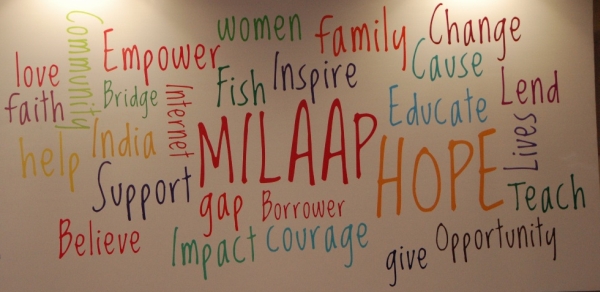The art of giving has undergone a sea change, from the times of our grandparents who didn’t think twice before giving up their own food to a beggar, to online donations today. We donate some amount to a charity or an NGO and attach the 80G certificate in our IT returns. We trust them to put our money to good use. Individual involvement is mostly not sought or is possible.
Oh yes, there are enthusiasts amongst us who run marathons, bake cakes and take out collections and others who do their bit at an individual level. But what of those who are unable to do any of the above for health or other reasons? Wouldn’t it be wonderful if they can be a part of dynamic social change? Sounds great, doesn’t it?
But before going into that, let me get something out of the way. I have a major problem with the word charity. It not only brings to mind images of the poor and the needy, but also conjures up another image, which is equally disturbing — that of a benevolent giver and a grateful receiver. The givers might feel superior or even smug for having done their bit for the poor, sometimes even going to the extent of expecting abject submissiveness from those who take their largesse. At the other end, the receivers either take it as their right or feel small and ashamed since their self-respect is compromised while taking the dole. Also, a dole only temporarily alleviates the need of a person and establishes a vicious circle of giving and receiving. Even indiscriminate populist sops and doles by the government fall into this trap and more often than not, are counterproductive. I had dealt with this in this post.
I wanted another word that made the act of giving satisfying for the giver and dignified for the receiver to accept it. A quick look at the thesaurus threw up gems like aid, support, endowment, fund, and assistance among others. Don’t they sound infinitely better than ‘charity?’
Just imagine the impact, if a needy person were to get assistance or aid to set herself or himself up in life. It leads to oodles of confidence and self-respect and sets in motion a ripple effect that impacts many lives. That’s why probably Confucius said, Give a man a fish and you feed him for a day. Teach a man to fish and you feed him for a lifetime.
This is also precisely why I liked the concept behind the Milaap model of aid. Their motto is to give the needy a “hand and not a hand-out.”
Milaap is a crowdsourcing company that funds several NGOs (Milaap calls them Partners) working in niche areas including skill training, education, energy, water and sanitation at the grassroots level to bring about social change.
Recently Indiblogger held the Hope Project meet in collaboration with Milaap in Mumbai. It was one blogger meet I wanted to attend but unfortunately couldn’t. The Hope Project focuses on the liberation and rehabilitation of Devadasis, who appallingly are still to be found in parts of Karnataka and Maharashtra. As part of an activity at the Meet, bloggers were asked to pick one defining word for the New Year. And just look at the words! I recognize many words that the thesaurus had thrown up as alternatives for ‘charity!’ Aren’t they all so positive, making one want to be part of the change?
It is true that anything given free of cost has little value and is treated as dole or favour by the receiver and even taken for granted. But when the aid comes as a loan, there is motivation to work and repay the loan. Milaap works on this premise and so any donation made is actually a ‘loan’. Once the loan is returned, it can be lent again to another applicant. It is a win-win situation all round because the NGOs have a ready source of funds, the individual borrower gets directly benefited and the person ‘lending’ the money gets back his loan in the stipulated time frame.
It comes as a revelation that a loan of less than Rs.10,000 can buy a solar powered lamp for a village household that has no electricity. And that it can make dramatic changes to the productivity of that household. Or for that matter, a small loan can help a family build a toilet – one of the basic needs of human beings, which is lacking in millions of households in India’s rural hinterlands.
One can start with as little as Rs.500 – an amount we spend in an ice cream parlour, without a second thought. Is it too much to set aside such a sum for helping a student, a family struggling without running water or toilet? I would think that the satisfaction gained from doing this would definitely be more than the momentary pleasure of eating an exotic flavour of ice cream. I was gratified to know how students in US universities raised money to help borrowers in remote towns and villages of India. Why, one can even become a volunteer to write and edit the stories of borrowers for the website if one can’t do any of the above.
The Milaap model should appeal even to the hardest-nosed businessman, for the amount one gives as a loan is repaid in the stipulated time frame. One can then extend the amount to another needy applicant. This is ‘reinvesting’ at its philanthropic best, isn’t it?
Milaap maintains a wonderfully exhaustive website where all details of its partners, their work, the number of people they have helped till date and other such details are provided. Individual applicants are featured, with such details as the money they need to complete their education/training or other requirements. The best part is that one can select the candidate one wants to help and even follow up the progress of that borrower. Ways one can be part of the efforts and success stories are presented in the form of videos. All this is done by volunteers around the world. I would strongly advise you to take tour of the website.
I particularly liked their ‘Gift a card’ idea. We all know that often it is a challenge to select a suitable gift for a loved one. Sometimes the gifts are duplicates, sometimes we only add to the already crowded wardrobes. Instead why not gift a Milaap card? The gift voucher can be redeemed at their website by the receiver to help someone. They then get updates on the progress of the person they have helped. I think it is especially a great way to teach children to learn the joys of giving and sharing with someone they have not even met, and that it actually gives them more joy than getting a gift for themselves
Come, let us give a hand to the deserving needy of our society by ‘investing’ in their future and discover the joys of giving and sharing.







Nice post zephyr ! I have been doing a bit according to my affordability. I will be adding Milap to my list.
LikeLike
Thanks Radha. I am sure you will find their website helpful.
LikeLike
I too believe in that theory of confuscious (guess I will never get that spelling right ) . I did not know about Milaap till I read this post and yes, I too don’t like the word charity. Aid and help sound better
LikeLike
I understand that — the spelling of Confucius, I mean 🙂 Check out their website. At least we can contribute by using the gift a card scheme even if we are not lending big amounts.
LikeLike
That was a very powerful message – “give a hand not a handout”!
LikeLike
Indeed it is!
LikeLike
Interesting concept. With so many NGOs in the reckoning, it is hard to zero in on a genuine one. Worth looking into. Thank you for the post.
LikeLike
So happy to read this post on a day just prior to Makar Sankranti, a day meant for making offerings! Just returned back after a holiday! Needless to say, a post that deserves to be read!
LikeLike
…read and acted upon, Rahul 🙂 Thank you for reading.
LikeLike
Thank you for this intro of MILAP. A good initiative indeed.
LikeLike
It indeed is. My only regret is that I missed the Meet.
LikeLike
I too am against charity and the cynic in me raises doubts about many NGOs because i have seen some.What you say sounds nice.
LikeLike
Everything is transparent, Indu. When I see that we spend money on entertainment and eating out without a second thought, I felt that some portion of that could be spent on helping someone. That is what made me do this post, even though I didn’t attend the meet myself.
LikeLike
Such a brilliant idea in giving. will definitely check it out and have the kids do their part too. I do small portions for few organisations over the year. Will check their website and include it in the list. It’s a wonderful idea to loan a donation, that way the cycle of the people getting help is more.
Thank you for writing this, BM.
LikeLike
you are welcome, Latha. I am so happy that you plan to make the children part of it too. They will get into the habit of giving early in life, that way.
LikeLike
Good one.
We used to contribute to various causes but have now zeroed down to giving to the blind school.
LikeLike
It is good to have one place and cause to support especially if you know it is going to the people whom you are helping. I have bitter experience with some blind schools, where the blind don’t get the benefit of the aid given by individuals.
LikeLike
What a lovely post written with sensitivity. I contribute regularly to worthy causes like Mid-day meal for children, toilets for girl children in schools and TERI’s initiating of lighting up Indian villages. I will add ‘Milaap” to my list. Feel so sad that I had to miss the meet that was held in Bangalore. My father and husband believe in helping someone in the neighborhood like a maid’s child’s education or a poor relative for education. I don’t even loan it but hope that they will pass on the good deed to someone needy. Education can empower and uplift in a manner nothing else can. Hope we all can do our bit in spreading smiles and empowering others. As always, a satisfying post to read!
LikeLike
You are indeed doing quite a bit, Rachna. What I liked best about Milaap is their various ideas for participation by people. They are simple and easy to do and the website is very easy to navigate and identify areas and causes too. The gift card scheme is my favourite among them all.
LikeLike
Very good post, Zephyr. We had helped some people on our own before they asked for it. They took the help and later on they started avoiding us. I think they were ashamed because they took help from us and later, they were not able to repay it or did not want to repay it. We lost a friend. Now, my husband’s motto is not to help anyone unless they as for it on their own.
Lending as you have described very well, is the best way to help. I will send this link to my son also. He does it via some organisations, which look shady, his brother says! As you say, there is no value for anything getting free. ‘ They have got money, they are giving us, so what’ attitude is very common here.
LikeLike
Sometimes it is better to wait to be asked for help. Let us hope they pass it on to others even if they don’t return you the money. What I liked best about Milaap is that they are transparent in their dealings. Everything is there on their website and your money can be seen helping people. That does afford peace of mind to the person giving money to someone, right? Hope your son finds it worthy of contributing to.
LikeLike
Today how many people think about dignity or self respect…they are just happy to get something free…I am against giving anything free in principle,,it should be something for something……it doesnt mean that I dont give or aid people , I do on a regular basis but would love to live in a society where nothing is free for anyone…..it may be called anything but in reality it should be taken as a loan only, which has to be repaid in essence, then only dignity can be maintained, otherwise whatevr name you give it it is CHARITY..
LikeLike
That is exactly why I liked the Milaap model, Renu and mentioned that the word charity has such negative connotation. Even I feel that hand outs will only make people lazy and expect more and more.
LikeLike
I am so glad you wrote about this. I wanted to attend this meet too, but could not.
Long before the Internet, webpages, and crowd sourcing happened, I used to see my father talking to and then visiting people involved in various projects, particularly so, after his retirement. It was almost always about educating and rehabilitation of women, and he dedicated this effort to my late grandmother who didnt have the benefits of a good education, as was the norm in her young days, when child marriages etc were the norm. I would hear him talk about a gentleman called Dr Bhimrao Gasti, who himself belonged to the caste that encouraged the devadasi system, but decided to rebel and dedicate himself to the upliftment of the women. I would see my father in correspondence with so many people doing good work, and visiting these set ups , well into his mid eighties.
A few weeks after he passed away in 2006, I got a letter . It was from Dr Bhimrao Gasti. Who mentioned how bereft they felt at the loss of someone who took so much interest in them visited them, and helped them out, with donations, books, fees etc for the individual and group education and training schemes. It was a very personal letter and not a standard condolence type thing. Among other things I was very gratified to note from his letter, that one of the ladies who emerged out of the devadasi set up, studied and went forth , was now employed as an administrative head at an NGO in the region. And more were following suit, encouraged by her example.
Sitting in Mumbai, worried about the latest OS on your so called smart phone or the latest sale at the millions of Malls, it is a good thing that this meet projected Milaap, as something we can help with and need to be greatly aware of. .
LikeLike
Every comment of yours throws up some interesting and valuable input to my posts, Suranga and I thank you for that 🙂 It is said that we are able to live as we do, in comfort and well because of the good deeds of our elders and ancestors. I endorse this belief completely. Aren’t we blessed to have such elders in our lives to guide us? Your presence at the Meet surely would have been an invaluable addition to the audience as you could have shared these thoughts personally.
LikeLike